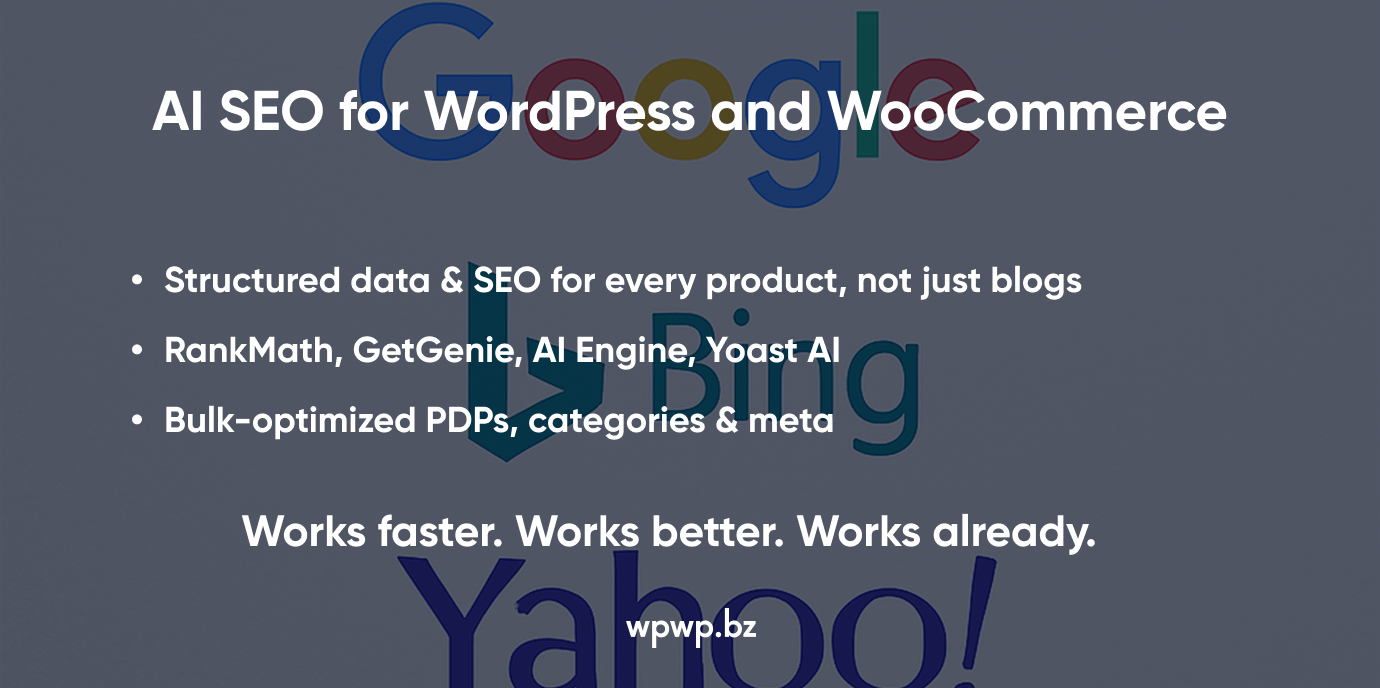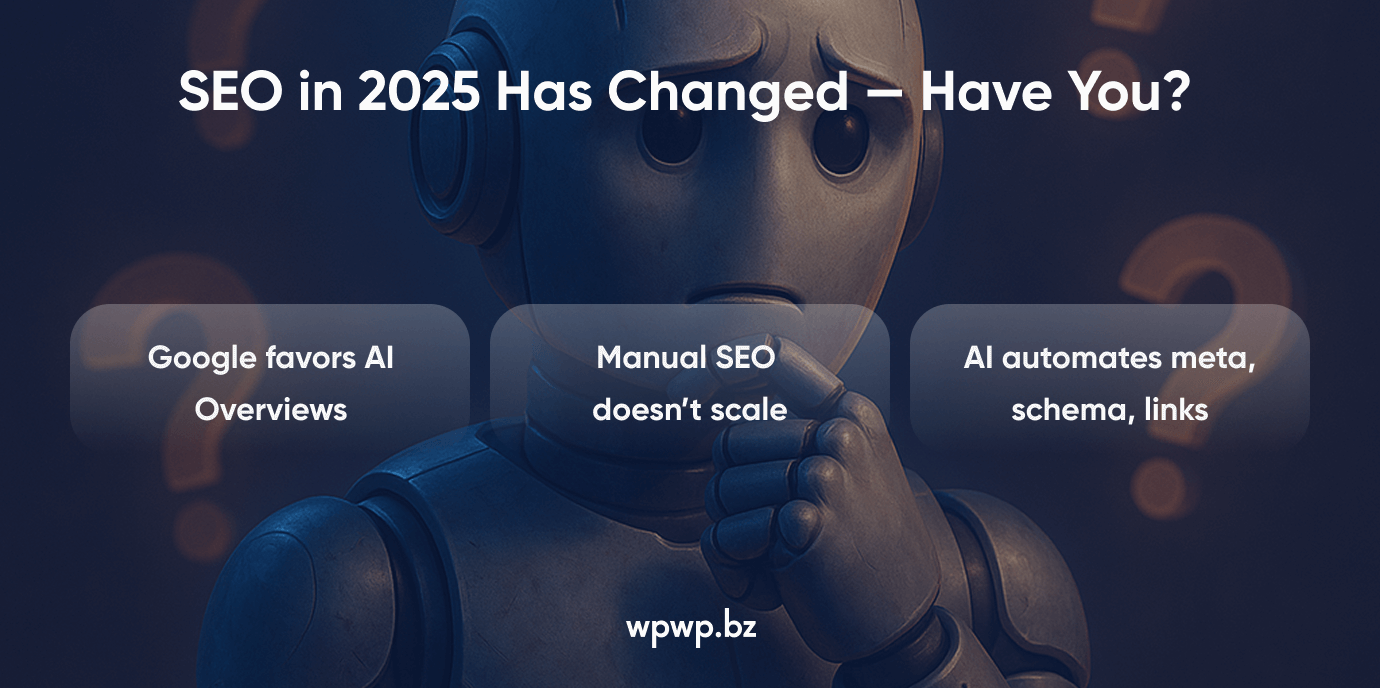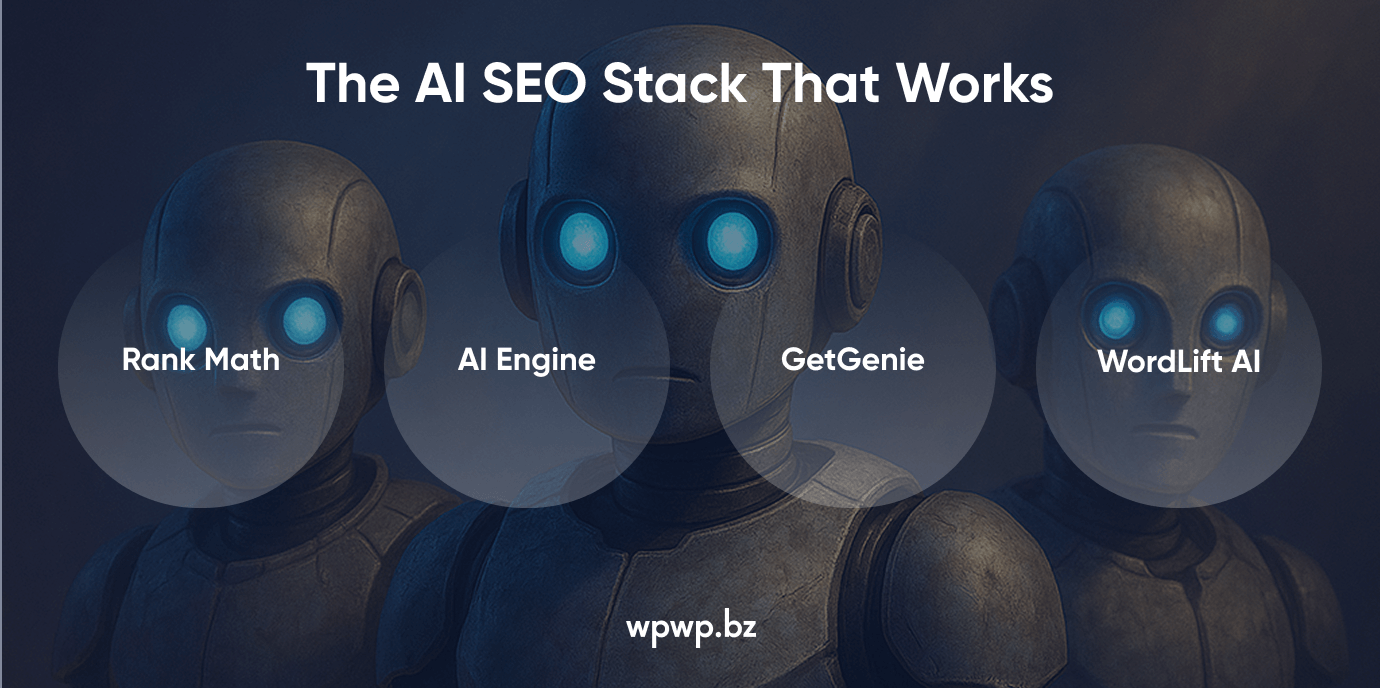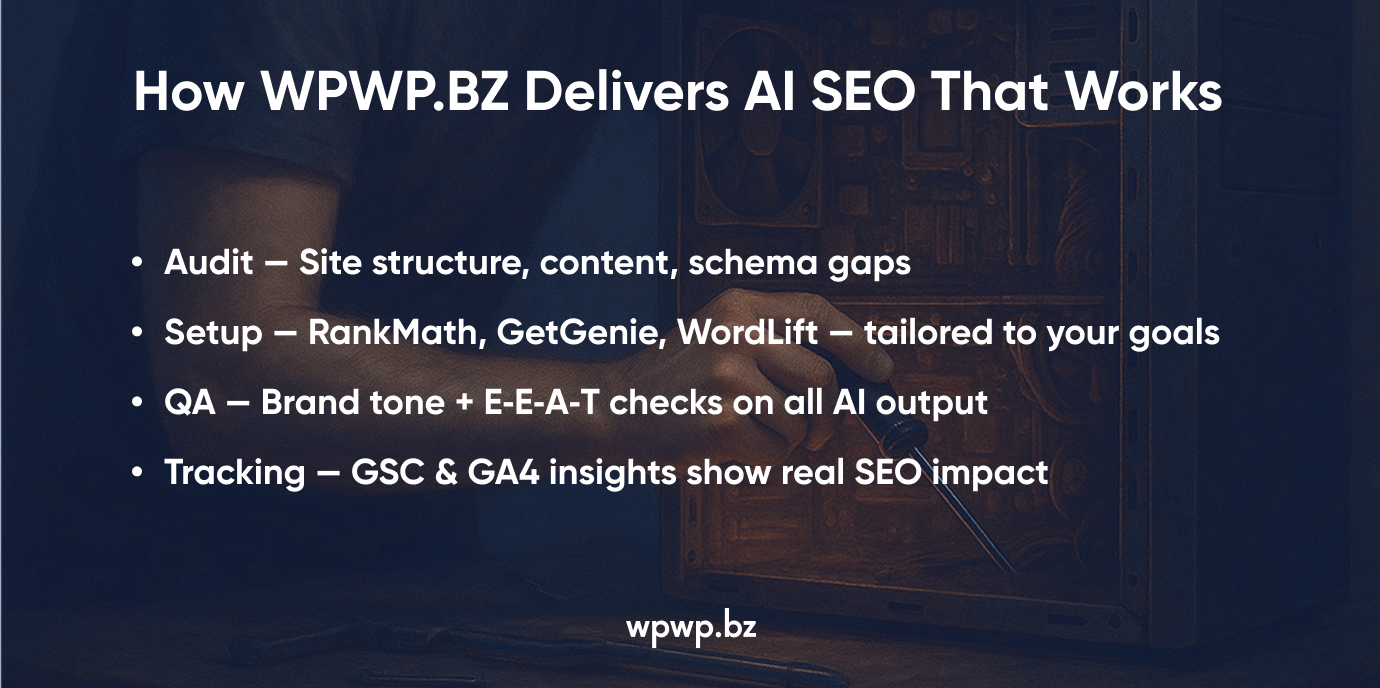We specialize in bringing these tools together into one seamless workflow. Instead of testing random plugins or running disconnected experiments, our team handles AI SEO integration for WordPress from start to finish: audit, setup, QA, and ongoing measurement. We work with leading solutions — Rank Math Content AI, AI Engine, GetGenie, WordLift, Yoast AI Optimize, Elementor AI, and Jetpack AI, to create content that’s not just optimized for search engines, but also aligned with your brand’s voice.For WooCommerce stores, this means going beyond blog posts and title tags. We apply AI plugins for SEO directly to product catalogs, bulk PDPs, and category pages. That ensures your entire eCommerce inventory is discoverable, structured, and competitive, whether in classic search results or in AI Overviews. In short, we doesn’t just install plugins; we turn them into a complete AI eCommerce optimization system that works for your business.

Why AI SEO Matters in 2025 for WordPress & WooCommerce
If you’ve been in SEO for a while, you’ve seen the cycle: tactics that worked a few years ago slowly lose their punch. Keyword tweaks, endless meta updates, even link-building — none of it delivers the same impact it once did. The big shift in 2025 is obvious: Google now leans heavily on AI Overviews and answer-style search. People type a question, and the engine spits back a summary. Only a handful of sites get cited. Everyone else vanishes below the fold.
That’s a tough reality for WordPress and WooCommerce owners. The problem is the workload. How do you optimize hundreds of product pages, keep schema accurate, and still push out fresh content? Manually, it’s close to impossible. This is why more teams are experimenting with AI for SEO in WordPress. Not as a gimmick, but as a way to offload the repetitive stuff: bulk descriptions, structured data, internal linking, and content tuned to what people actually ask in search.
For online stores, the payoff is even bigger. Imagine trying to update a WooCommerce catalog of 5,000 SKUs by hand. It doesn’t happen. With AI SEO in WooCommerce, you can roll out changes across entire categories, generate product details at scale, and make sure Google sees the right structured signals without burning through months of manual work.
Agencies like Go Fish Digital talk about citations and answer-driven content. They’re right. The difference now is that WordPress site owners can actually put those strategies into practice with automation. You don’t need a giant SEO department, you just need the right setup.The takeaway? SEO is shifting under our feet. If you want to keep showing up in search, adapting to automation is survival — and the best way to start is by improving your foundation through WordPress SEO tools integration.

The AI Tools Ecosystem: From Plugins to Platforms
Choosing the right AI tools for SEO can feel overwhelming. We’ve tested them across real WordPress and WooCommerce projects, and we’ve learned which ones deliver consistent results and which are better left as experiments.
For day-to-day optimization, we often start with Rank Math Content AI. It gives clear keyword suggestions, generates titles and descriptions, and integrates smoothly with WooCommerce product pages. For teams that already rely on Yoast, Yoast AI Optimize is another safe choice, it enhances the familiar Yoast workflow with automated metadata and readability improvements. Both are great entry points when you want to bring AI SEO to WordPress without disrupting existing processes.
When it comes to content creation at scale, we recommend pairing GetGenie or AI Engine with your editorial or product workflows. They’re lightweight but powerful, making them ideal for generating bulk PDP descriptions, blog drafts, and even FAQs that feed into search intent.
For more advanced needs, especially if you want visibility in AI Overviews, structured data becomes critical. That’s where we turn to WordLift AI Schema. It doesn’t just add schema tags; it builds a knowledge graph around your content, helping Google understand your products, categories, and brand authority. In practice, we’ve seen this lead to better inclusion in answer boxes and citation-based results.
On the design and content side, Elementor AI SEO and Jetpack AI Assistant are valuable for teams that want copy and layout support inside the editor. Elementor AI helps with headlines and page copy during design, while Jetpack AI can handle quick blog or product content directly in Gutenberg.
Our typical stack depends on the business model:
- Blogs & content-heavy sites → Rank Math Content AI + Elementor AI for quick optimization and layout-friendly copy.
- WooCommerce stores with 1k+ products → GetGenie (bulk content) + WordLift (schema/knowledge graph) + Yoast AI Optimize (metadata consistency).
- Enterprise setups → A tailored mix, often layering WordLift with multiple plugins to cover scale, multilingual catalogs, and performance tracking.
The bottom line: you don’t need every AI tool on the market. You need the right mix, set up correctly. That’s what we do — test, integrate, and refine until your WordPress site or WooCommerce store has an AI SEO system that actually drives visibility and sales.

How We Integrates AI SEO
Most businesses test an AI plugin once, get uneven results, and assume it doesn’t work. The reality is that AI SEO integration in WordPress only pays off when it’s done as part of a structured process. We’ve built a repeatable framework — audit → setup → QA → tracking, that makes SEO automation reliable instead of risky.
1. Site & Content Audit
We start by reviewing the foundation. That means checking your WordPress setup, theme performance, and technical SEO health, but also looking at how content is structured. Product pages, blog posts, and category archives are all analyzed. Schema is a big part of this audit too, we map which pages already use structured data and where gaps exist. This stage tells us what your site needs before we even touch plugins.
2. Setup & Configuration
Once we know the baseline, we move to implementation. Here we implement AI tools in WordPress and WooCommerce, configuring them for your workflows. Rank Math Content AI or Yoast AI Optimize for metadata, GetGenie for bulk PDP descriptions, WordLift for schema — every tool is set up with your specific catalog, language, and SEO goals in mind. If a plugin doesn’t cut it, we integrate via API for more control. The result is not a random stack of plugins, but a tailored automation setup powered by custom WordPress plugin development.
3. Quality Assurance (QA)
AI can produce content fast, but speed without quality hurts rankings. That’s why QA is non-negotiable in our process. Every AI output is checked against E-E-A-T principles (experience, expertise, authoritativeness, trustworthiness). We filter out duplication, enforce your brand voice, and adjust for readability. Think of it as training the AI on your tone while keeping Google’s quality standards in play.
4. Tracking & Measurement
The final step is proof. We set up measurement inside Google Search Console and analytics platforms, with annotations marking when AI SEO changes go live. From there, we track CTR shifts, position deltas, and schema coverage growth. This makes the impact of automation visible, so you see exactly how AI SEO integration in WordPress is moving the needle.

WooCommerce in Action: Bulk SEO for Products, Categories & Schema
If you’ve ever managed a large WooCommerce catalog, you know the pain. Hundreds of SKUs, thousands of product pages — each one needs titles, descriptions, schema, and updates. Doing it by hand is exhausting, and often half the catalog ends up ignored. This is exactly where bulk SEO automation in WooCommerce delivers real value.
We use AI to turn what would take months into weeks. Here’s how it works in practice:
1. Product Descriptions at Scale
- With tools like GetGenie and AI Engine, we generate AI product descriptions for WooCommerce in bulk.
- Each product gets unique copy, optimized with keywords, structured for readability, and still written in your brand voice.
- No more duplicate “placeholder” text or generic manufacturer blurbs.
2. Smarter Schema Markup
- We add Product, Offer, and Review schema automatically across your catalog.
- Currency formatting is localized (UAH for Ukraine, EUR/USD for international stores).
- Rich snippets in Google results improve click-through rates and trust.
3. Category & Filter Optimization
- Bulk-generated category descriptions help capture long-tail search queries.
- Canonical and noindex rules keep filter pages from cluttering Google’s index.
- This keeps your store clean technically, while still offering great navigation for customers.
4. Multilingual & Regional Readiness
- We implement hreflang tags for markets like Ukraine (uk) and Russia (ru).
- That way, the right language version shows up for the right audience.
The impact is tangible. One client saw:
- +22% impressions in Google Search Console after schema rollout.
- +15% higher CTR on product results once descriptions were updated with AI.
- Thousands of SKUs optimized in weeks instead of quarters.
So when people ask, “What’s the best AI plugin for WooCommerce product SEO?” — the answer isn’t one tool. The winning setup usually looks like this:
- GetGenie or AI Engine → product and category content
- Rank Math Content AI or Yoast AI Optimize → metadata consistency
- WordLift AI Schema → structured data and knowledge graph coverage
Our job is to connect these pieces into a single automated SEO system. You focus on selling, while the catalog stays optimized.
Preparing Your Site for AIO/SGE and AI Citations
The next frontier of search isn’t just keywords or snippets — it’s AI Overviews. Google now pulls answers directly into its results, citing only a handful of trusted sources. If your site isn’t prepared, it won’t get picked up. This is where Generative Engine Optimization (GEO), sometimes called AEO (Answer Engine Optimization), comes into play.
We help WordPress and WooCommerce sites get “citation-ready.” That means making sure Google and other LLMs can not only read your content but also trust it enough to surface in AI summaries.
Key Steps We Recommend
- Structured Data Grounding
- Add detailed schema (products, reviews, offers, FAQs).
- Ensure markup is clean, validated, and localized (e.g., UAH pricing).
- Content Built for Citations
- Clear, factual answers to common queries.
- Supporting context so AI models don’t misinterpret.
- Technical Readiness
- Implement files like llms.txt to guide how large language models crawl.
- Use RAG (retrieval-augmented generation) strategies so content is more discoverable.
- Authority Signals
- Strong internal linking and references to credible sources.
- E-E-A-T checks so AI models recognize expertise and trustworthiness.
Why It Matters
- Sites with ai citations SEO practices in place are more likely to appear as cited sources in AI results.
- Proper schema and content structure directly affect how your brand is pulled into Google AI Overviews SEO.
- Instead of competing only for rank 1–3, you position your site to show up in the answers themselves.
In short, preparing for AIO is about ensuring your WordPress or WooCommerce store becomes part of the answers people see. The businesses that adapt early will own visibility in this new AI-driven search landscape.
Conclusion: Start AI SEO with Us
Let’s be honest — SEO in 2025 looks nothing like it did a few years ago. Google’s leaning on AI, and sites that don’t adapt are already slipping down the results. You can try a plugin here and there, but without a clear system, it won’t stick. That’s exactly why our team offers full AI SEO implementation for WordPress and WooCommerce — not experiments, but real integration that works.
Here’s how we usually tackle it:
- Audit → a deep dive into your site’s content, schema, and technical setup.
- Plan → picking the tools that actually fit your catalog and market.
- Integration → we configure, QA, and track everything so you’re not guessing.
This isn’t theory, we’ve seen WooCommerce stores with thousands of products finally scale their SEO in weeks instead of quarters. Blogs that were stuck on page two start appearing in AI Overviews. And it’s not luck. It’s a process.
If you’re serious about visibility, don’t waste months testing plugins in isolation. Bring in a team that knows WordPress inside out. We will handle the WooCommerce AI SEO integration so you can focus on running your business.
Ready to move? Book an audit, get a plan, and let’s make AI SEO work for you.














